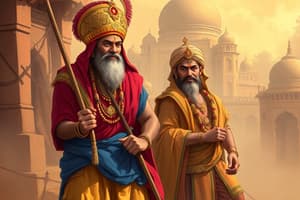Podcast
Questions and Answers
Who led the conquests that marked the beginning of the Delhi Sultanate?
Who led the conquests that marked the beginning of the Delhi Sultanate?
- Mohammed Ghori (correct)
- Muhammad bin Tughluq
- Alauddin Khilji
- Iltutmish
Which dynasty succeeded the Khiljis in ruling over much of the Indian subcontinent?
Which dynasty succeeded the Khiljis in ruling over much of the Indian subcontinent?
- Sikhs
- Marathas
- Tughlaqs (correct)
- Mughals
What was the purpose of the iqta system introduced by the Sultans?
What was the purpose of the iqta system introduced by the Sultans?
- To promote social mobility among Muslims (correct)
- To establish a centralized treasury system
- To expand the empire through military conquests
- To impose taxes on non-Muslims
Which policy aimed at fostering unity across different religions during the Delhi Sultanate?
Which policy aimed at fostering unity across different religions during the Delhi Sultanate?
When did the Delhi Sultanate era come to an end?
When did the Delhi Sultanate era come to an end?
After conquering northwestern India, which region did Mohammed Ghori target next?
After conquering northwestern India, which region did Mohammed Ghori target next?
During the Delhi Sultanate, which architectural styles were combined to create magnificent structures like Qutub Minar and Feroz Shah Kotla?
During the Delhi Sultanate, which architectural styles were combined to create magnificent structures like Qutub Minar and Feroz Shah Kotla?
In what languages did literature flourish during the Delhi Sultanate?
In what languages did literature flourish during the Delhi Sultanate?
Which policies did Akbar implement to unite Hindus and Muslims?
Which policies did Akbar implement to unite Hindus and Muslims?
What led to the eventual decline of the Delhi Sultanate?
What led to the eventual decline of the Delhi Sultanate?
Which empire emerged following the Timurid invasion in the late 14th century?
Which empire emerged following the Timurid invasion in the late 14th century?
What aspects of Indian society did the Delhi Sultanate impact according to the text?
What aspects of Indian society did the Delhi Sultanate impact according to the text?
Flashcards are hidden until you start studying
Study Notes
Delving into the Delhi Sultanate's Chapter of Indian History
The Delhi Sultanate, established around 1206 CE, marked a significant era in India's history characterized by political consolidation and cultural synthesis under Muslim rule. This period, which lasted until the early decades of the 15th century, witnessed both conflict and cooperation between Hindu rulers and Islamic invaders, contributing to the fascinating tapestry of Indian civilisation. Let's explore some pivotal aspects of this epoch.
Origins: Invasions and Establishing Rule
The Delhi Sultanate began with the conquests led by Mohammed Ghori, who initially targeted northwestern India before extending his reach deeper southwards. His successor Iltutmish capitalized on these gains by establishing Delhi as the central seat of power. After a brief interlude under the Khilji dynasty, Tughlaq descendants, beginning with Muhammad bin Tughluq, solidified their dominion over much of the subcontinent.
Administrative Reforms and Social Integration
The Sultans introduced various administrative reforms such as the iqta system—a land grant scheme—which facilitated social mobility among Muslims while also alleviating fiscal pressure from the treasury. Additionally, they endeavored to integrate diverse communities within their folds through policies like jizya, a tax imposed on non-Muslims in exchange for protection, promoting cohesive unity across religions.
Cultural Synthesis: Arts and Literature
In tandem with socio-political changes came artistic innovations that accentuated Indian culture. Persian architectural styles complemented local traditions to create magnificent structures like Qutub Minar, Feroz Shah Kotla, and the Alai Darwaza, all testaments to the multifaceted heritage of the time. Similarly, literature flourished during the Delhi Sultanate, particularly in two languages: Persian and Hindavi (an early form of Urdu). Works crafted by Amir Khusro Dihlavi, Ziauddin Barni, and others highlight the prodigious creativity arising from syncretic influences.
Religious Encounters and Conflicts
These years were punctuated by religious rivalries, with Islam clashing against Hinduism and Sikhism. Battles waged between the armies of the sultans and Rajput warlords often served as flashpoints, with both sides striving to assert their supremacy. However, it was not solely a narrative of animosity; religious interactions also yielded fruitful exchanges and mutual respect. For instance, Akbar's policy of din-e ilahi sought to unite Hindus and Muslims through shared spiritual ideals.
Decline and Legacies
Despite its achievements, the Delhi Sultanate eventually succumbed to internal strife and external aggression. Following the Timurid invasion in the late 14th century, the Lodhis gained control, setting the stage for the emergence of Mughal Empire less than half a century later. Notwithstanding this eventual decline, the Delhi Sultanate remains a cornerstone of Indian history due to its lasting impact upon society, culture, politics, and religion.
To summarize, the Delhi Sultanate left indelible marks on the fabric of Indian society, offering rich insights into the historical matrix of India's past, present, and future. Its legacy continues to reverberate throughout contemporary Indian life via myriad cultural expressions, including architecture, literature, arts, philosophy, and more.
Studying That Suits You
Use AI to generate personalized quizzes and flashcards to suit your learning preferences.




